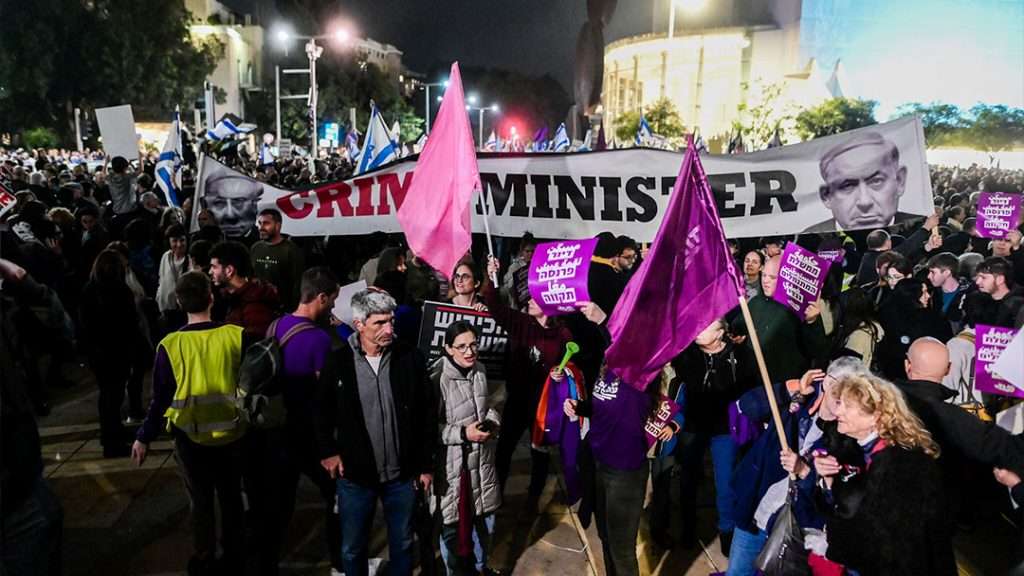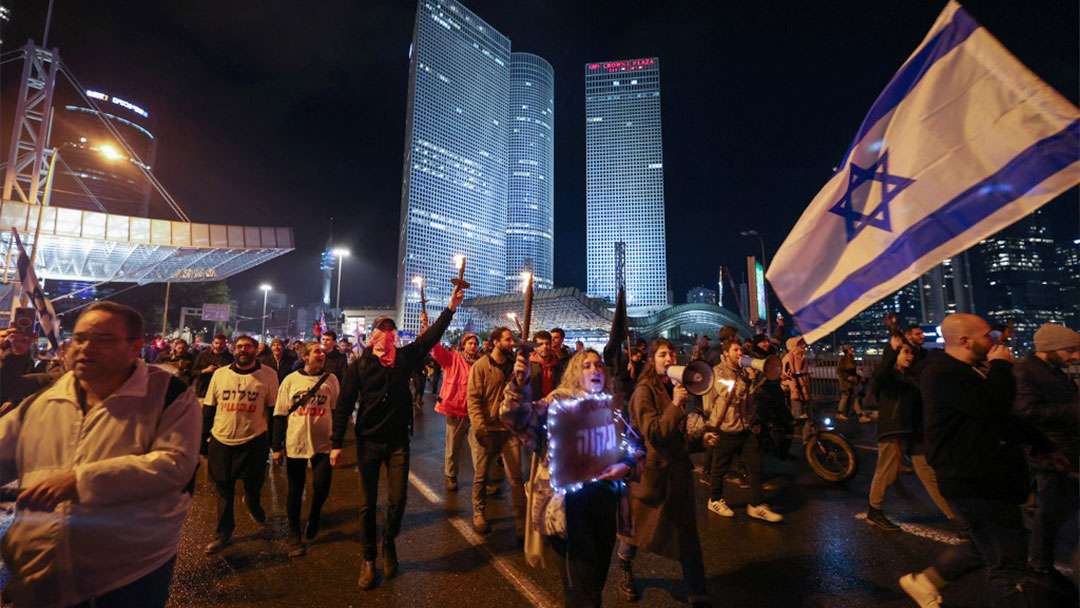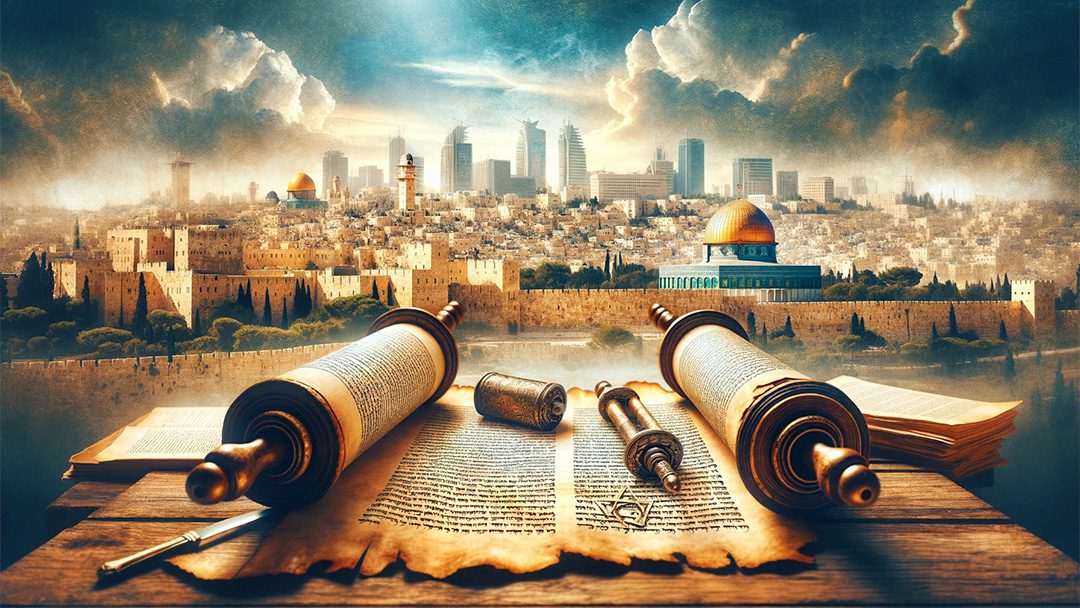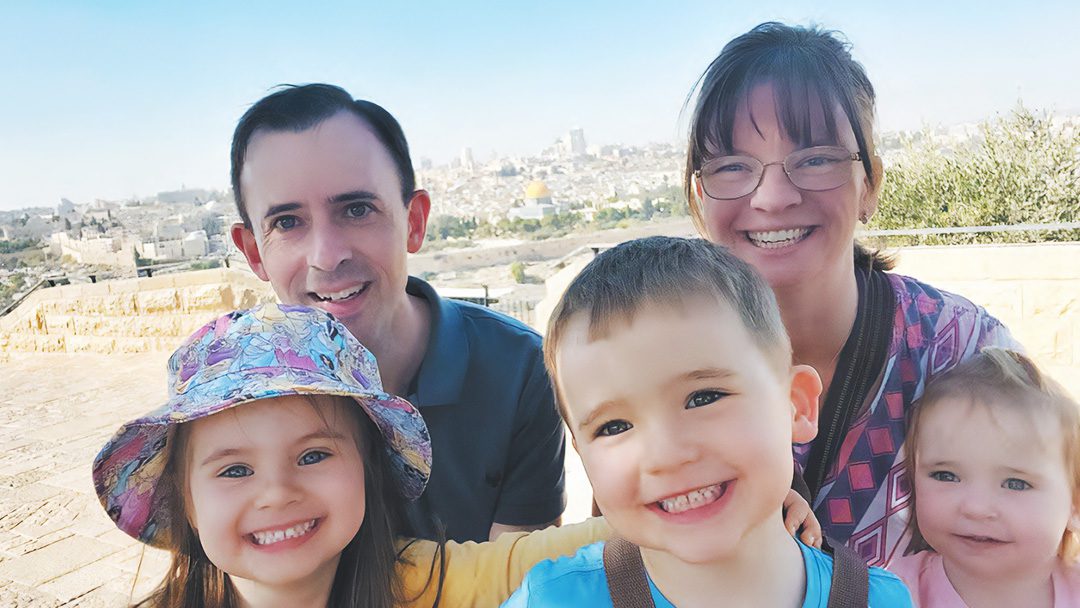STOP PRESS: On January 19, Israel’s Supreme Court barred a member of the new Netanyahu government from serving as minister. The decision should be seen against the backdrop of what appears below. Go to these links for details:
- Israel’s Supreme Court rejects Deri as minister in Netanyahu government:
www.jns.org/israels-supreme-court-rejects-deri-as-minister-in-netanyahu-government
- Supreme Court Declares War on Netanyahu’s Government, Cancels Minister Aryeh Deri:
The election that had millions of Israeli voters placing a conservative government in power, and then saw tens of thousands of furious citizens take to the streets to oppose it, has caused confusion and uncertainty among Christian watchers of Zion. How to understand what is happening in the Jewish state which in four months celebrates the 75th anniversary of its rebirth?
On November 1, 2022, 16 months after the Bennett-Lapid coalition was elected, a large majority of Israel’s Jewish voters replaced it with a new administration under Binyamin Netanyahu.
In this election:
- 4.7 million Israelis voted for the parties that made it into the Knesset’s 120 seats.
- 64 seats went to the right—the pro-Netanyahu Jewish national and religious parties.
- 46 seats went to the left—the anti-Netanyahu Jewish liberal-progressive parties.
- (10 seats went to the pro-Palestinian/anti-Israel Arab parties. Insofar as Jewish Israelis’ aspirations for their state go, those votes are irrelevant here).
- The totals of the right and left Jewish parties votes was 2,304,964 vs 1,669,596.
Out of a total 3.9 million Jewish voters, the Right-Religious beat the Left-Progressive 66 to 44 percent. An indisputably democratically-secured win.
On December 29, the new government was sworn in. It hit the ground running.
Ten days into the fresh reality, Prime Minister Binyamin Netanyahu proclaimed: “We have established a different government with a different policy, and everyone will see this.”
By then most people—Israeli citizens and international onlookers alike—already could.
When I mentioned to a long-standing Israeli friend how strikingly the headlines had become, his face lit up. “What a change!” he enthused. “At last, we have hope!”
But for many there is more uncertainty than hope. I have heard, from Israeli Jews (among them believers in Jesus), and from Jews and Christians abroad, outspoken condemnation of the new government in expressions of anger, anxiety and despair. One believer even told me that he has decided to “join the resistance” against it.
In the weeks between election and the installing of the new, free and fairly elected, leadership, the defeated politicians, together with their allies, (politicised supreme court judges, officers in the top tier of the IDF, town councillors, schoolteachers and sexuality-obsessed militants, all platformed by a sycophantic news media), openly incited against it.
Nothing was unacceptable. There was no constraint. Fear and fury were consciously fomented. Following the well-worn playbook of socialist-leaning secularists, the Left projected its insurrectionism onto the Right, accusing the incoming leadership of dashing democracy on the rocks and leading the country to civil war.
What is happening is really only the latest manifestation of a very long-standing and deep divide among the Jewish people.
Chosen as pretext for their shockingly undemocratic behaviour, immediately after the government was sworn in, was its embarkation on a path of judicial reform—reform that all parties in the new coalition had included in their election platforms.
On January 7 and 14, in gatherings orchestrated and funded by liberal American Jews, tens of thousands of Israelis protested against the government, which a former prime minister, Ehud Barak, labelled “illegitimate”. Inflammatory speeches whipped up the crowd. It was a hysterical demonstration; more are planned.
And yet, as Netanyahu told the nation after the second protest: “Two months ago, there was a huge demonstration in Israel… Millions of people took to the streets to vote in the elections. One of the main issues they voted for is reforming the judicial system.”
It will not be easy for observers to understand the increasingly chaotic and toxic situation. Christians who know their Bibles can, however, make sense of it, and thereby bring their responses and prayers into line with God’s Word.
What is happening is really only the latest manifestation of a very long-standing and deep divide among the Jewish people. The battle-lines are clear. They go to the very core of what it means “to be a Jew.”
The struggle is an in-house one between Jews holding radically different views on Judaism itself as well as on what the Jewish state should look like. Nor is it new. This kulturkampf goes back more than 3000 years: it has split the Hebrews since Moses conveyed God’s message to them at the inauguration of the brand-new nation of Israel:
“…if you will indeed obey My voice and keep My covenant, then you shall be a special treasure to Me above all people … And you shall be to Me a kingdom of priests and a holy nation…” (Exodus 19:5-6)
“But…if you do not obey the voice of the LORD your God, to observe carefully all His commandments and His statutes…all these curses will come upon you…” (Deuteronomy 28:15)
It’s the choice that has always stood before them: Live according to the Torah, and it will “go well for you and for your children after you forever.” Stray, and your future will be increasingly dark.
This is what devout Jews believe, pointing to their nation’s particularly painful history.
Unbelieving Jews, however, seek to modify or adjust Judaism to fit their progressive world-view—positing humanistic reasons for Jew-hatred; even blaming it on their observant fellow Jews.
It is an unbridgeable divide.
What the Jewish people overwhelmingly have agreed on for 2000 years, is that Rome’s destruction of Jerusalem and the Temple, with its accompanying mass slaughter and scattering of the nation, was directly attributable to their own internal strife (in Hebrew: sinat chinam, lit. baseless hatred) which degenerated into a dreadful civil war.
That hatred was between Jews who wanted to live and let live in the Roman Empire, (the world of their day) on the one hand, and those who were zealous for their Jewish faith and sovereignty, on the other. As the factions raged, “ordinary” Jews who—like today—wanted to be left in peace, were seduced or forced into opposing sides.
The nation self-destructed from within, enabling its near-complete destruction from without.
Today, this sinat chinam is rife, and along very similar lines. It has not been uninfluenced by what has happened in the once “Christian West”:
For generations, liberalism has been making massive inroads into Judeo-Christian civilisation—assaulting conservative values and, via the media, police and law courts, compelling progressivism on those who oppose it, deeming Christians enemies: “enemies of the state”; “enemies of democracy,” and an assortment of “phobes.”
In the US, this culture war exploded with the ascendency of Donald Trump. His presidency was, correctly, seen as an existential threat to everything The Left had been deep-planting for decades. Trump spelled doom to their ambitions, and breathed hope into almost-defeated, conservative America. More than anything else, it is the extreme danger he posed to the progressives’ program that fired the frantic, teeth-gnashing reactions against him.
At Trump’s bewildering 2016 victory, the American Left, (within whose fold a major chunk of that nation’s syncretised Jews have their home), raised a black flag. He had to be gotten rid of, no matter what it took or how unlawful the means of resistance. No quarter.
Not even his—dubious—defeat by Joe Biden was enough. Skulduggery has continued apace, from “January 6” misrepresentations to FBI raids for classified documents; the displaying of his tax records … the list continues. There is no way in which that man can be permitted to return to the Oval Office. The Left’s version of America must be preserved at all costs.
Which brings us back to Israel.

The Jews have followed their own trajectory. Their divisions run along a number of fault lines, but, in Israel, mostly lie as follows:
On the one side are those who practice Judaism as their forefathers did for more than 2000 years—religious Jews of various stripes—and who believe in their God-given right to their ancestral home. They reject the global effort to drive them off their land and create a Palestinian enemy state in their place.
In their ranks (though they might argue that they are a rank of their own) are the secular Zionists. They don’t attribute a whole lot to God, but they ardently believe that the Land of Israel is the cradle of their nationhood and their lawful heritage.
On the other side are the Jews who either repudiate religion and embrace secularism, or who practice a syncretism of Judaism mixed with progressivism, from which place they dismiss the notion that Jews have any claim to the “West Bank.” These Jews will frequently align themselves with the anti-Judeo-Christian world against the State of Israel.
What is happening today is, therefore, described as a clash between “the Jews” and “the Israelis” in Israel.
“The Jews”, on the one hand, are those who want to be Jewish first and foremost—Jewish in the Torah-observant, rabbinical way. The “Jewish state” they envisage is as different from all other nation states as the Jews in the Diaspora were for centuries different from the Gentiles among whom they lived. Assimilation, to them, was and is anathema. They hold to the doctrine of a personal Messiah and the restoration of sacrificial worship in the Temple. They believe in the geulah—redemption.
“The Israelis”—on the other hand—are those Jews who want a State of Israel that is modern, and liberal-progressive; a state which courts favour from the international community and comfortably fits into the Global Village. For them, Israel should no longer be “A people dwelling alone, not reckoning itself among the nations” (Number 23:9).
This was the Israel which the late Shimon Peres and his “Peace Camp” sought to construct. Peres despised the devout sectors of Jewish society; he saw national religious Zionists and the Ultra-orthodox as an embarrassment, a kind of antiquated throwback.
It was, in fact, Peres who, in his own words,1 spurned and labelled them as “The Jews” while upholding the non-religious, himself included, as “The Israelis.” Before he became state president he infamously told2 observant activist Ruth Matar, (an Austrian-born Holocaust survivor who co-founded the NGO, Women for Israel’s Tomorrow,)3 to “go back to where you came from.”
Reform Judaism, which is the largest Jewish sect in the United States, and has adherents in numerous other countries, including Israel, was established in 19th-century Germany. It rejects Rabbinical Judaism as archaic and the theophany at Mount Sinai as insignificant. These Jews say that they are “attuned to that of the Christian surroundings in which they live.” In other words, they have succumbed to a kind of assimilation.
Israel’s cultural war is reaching its apex. Clearly, according to His numerous promises, this is not what God has brought the Jews home for. How things will unfold we cannot precisely know, but Israel has an appointment with the One Who founded her. As He says, He is returning the people to the Land and the Land to the People. And, as He says, He is to return them to Himself. This is their destiny. His purpose, unhindered and uninterrupted, will stand.
“For I will take you from among the nations, gather you out of all countries, and bring you into your own land. Then I will sprinkle clean water on you, and you shall be clean; I will cleanse you from all your filthiness and from all your idols. I will give you a new heart and put a new spirit within you; I will take the heart of stone out of your flesh and give you a heart of flesh. I will put My Spirit within you and cause you to walk in My statutes, and you will keep My judgments and do them. Then you shall dwell in the land that I gave to your fathers; you shall be My people, and I will be your God.” (Ezekiel 36:24-28)
References:












0 Comments